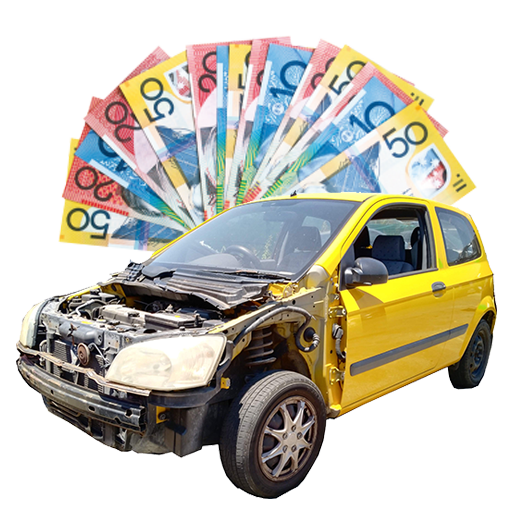When you hand over your old car, wreckers aren’t just eyeballing the shell—they’re on the hunt for hidden value. A simple rust-bucket might fetch $150, whereas a late-model SUV with in-demand parts could land you $8,999 or more.
These figures rest on three big factors: the weight of scrap metal, the resale value of reusable parts and the current market buzz around your make and model.
A Quick Guide To Car Wrecker Payouts
Think of your vehicle as a chest full of sellable treasures. The body panels might only fetch scrap-steel rates, but components like the engine, transmission and electronics hold most of the payout.
Understanding The Payout Tiers
Offers fall into familiar brackets depending on what can be salvaged:
- End-Of-Life Vehicles: Non-running 1995 Holden Commodore – $150 to $500
- Older Complete Cars: 2004 Toyota Corolla – $400 to $1,500
- Damaged Late-Model Vehicles: 2018 Mazda CX-5 – $1,500 to over $10,000
- High-Demand 4x4s and Utes: 2012 Toyota Hilux – $2,000 to $9,000+
Below is a concise breakdown of typical payouts by vehicle category, age and general condition.
Estimated Payouts From Adelaide Car Wreckers By Vehicle Type
This table shows the typical price ranges you can expect from car wreckers based on the vehicle's category, age, and general condition.
| Vehicle Type | Example Model | Condition | Estimated Payout Range (AU$) |
|---|---|---|---|
| End-Of-Life Vehicles | Holden Commodore (1995) | Non-running | $150 – $500 |
| Older Complete Cars | Toyota Corolla (2004) | Running, damage varies | $400 – $1,500 |
| Damaged Late-Model Vehicles | Mazda CX-5 (2018) | Accident-damaged, drivable | $1,500 – $10,000+ |
| High-Demand 4x4s and Utes | Toyota Hilux (2012) | Wrecked but salvageable parts | $2,000 – $9,000+ |
These figures paint a clear picture, but every car tells its own story. Supply accurate details—year, mileage and damage levels—to help wreckers fine-tune their offer. For a deeper dive into how payouts are calculated, check out our guide on how auto wreckers pay for cars.
What Determines Your Car's Wrecking Value?
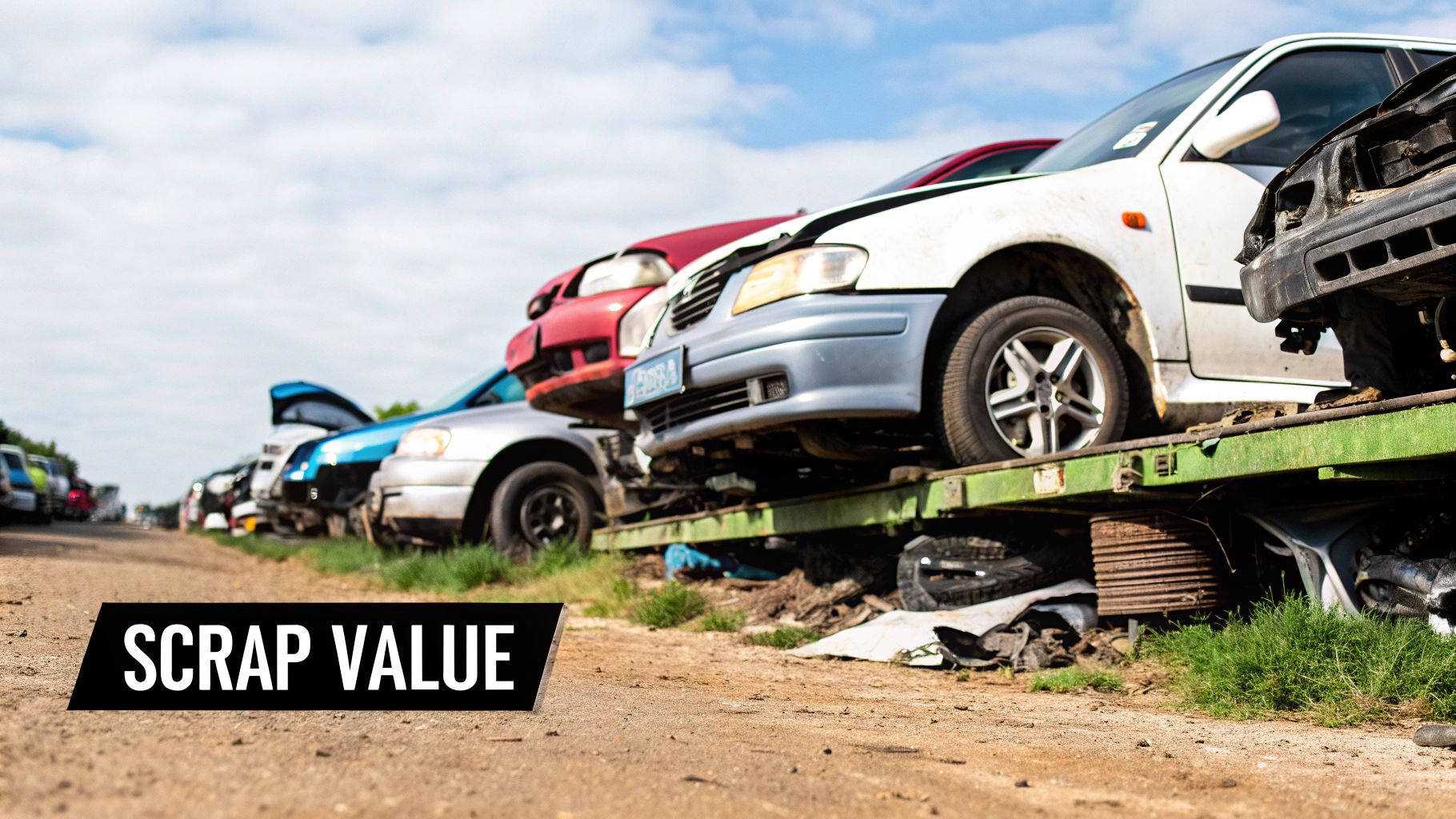
So, you're wondering, "how much will a car wrecker actually pay me?" It's a great question, and the answer is a bit more detailed than just quoting a price based on size or age. Think of it like a treasure hunt. Wreckers aren't just buying a car; they're buying a collection of parts, each with its own potential value.
Every vehicle has a unique story, and that history directly impacts the final cash offer. A tiny detail you might overlook could be the very thing that adds a couple of hundred dollars to your payout. Getting a handle on these factors will give you a much better idea of what your car is really worth.
The Make, Model, and Year Equation
The first thing any wrecker will ask for is your car’s make, model, and year. This isn't just basic admin. These three details are a powerful snapshot of market demand. A common vehicle on Adelaide roads, like a Toyota Hilux or a Holden Commodore, is a goldmine for parts.
Why? Because thousands of them are still driving around, and their owners constantly need spare parts for repairs. This creates a steady, predictable demand that wreckers can bank on. On the flip side, a rare European import might be a great car, but if nobody is looking for its parts, its value to a wrecker is mostly just its weight in scrap metal.
The rule of thumb is simple: the more popular your car model, the more its individual parts are worth. High demand for parts equals a higher cash offer for you.
This is especially true for older cars, where the cost of essential maintenance tasks for older vehicles starts to become more than the car is worth. Even so, an old but reliable model can still command a decent price if its key components are sought-after.
Condition and Completeness Are Key
Next up is the physical state of your car. This is where the real inspection happens. A wrecker will look over the vehicle to figure out what’s still usable. For instance, a car with a smashed front end might have a ruined engine, but the doors, seats, and gearbox could be in mint condition and ready for resale.
Here’s a quick rundown of what they’re looking for:
- Major Mechanical Components: Is the engine seized? Can the transmission still select gears? These are the big-ticket items.
- Body Panels and Interior: Doors, bumpers, headlights, and even the dashboard are all easily salvageable if they're in good nick.
- Completeness: Is the car all there? A vehicle that's been picked apart for a few bits and pieces is worth less. A missing catalytic converter or alternator, for example, will definitely lower the offer.
Even a car that doesn't run is valuable, as long as it's whole. If key parts are missing, the wrecker has to spend time and money finding replacements, which cuts into the price they can offer you. At the end of the day, the more complete and less damaged your car is, the more money it represents for them—and for you. Always be upfront about the car's condition to get the most accurate quote from the get-go.
The Baseline Value of Scrap Metal
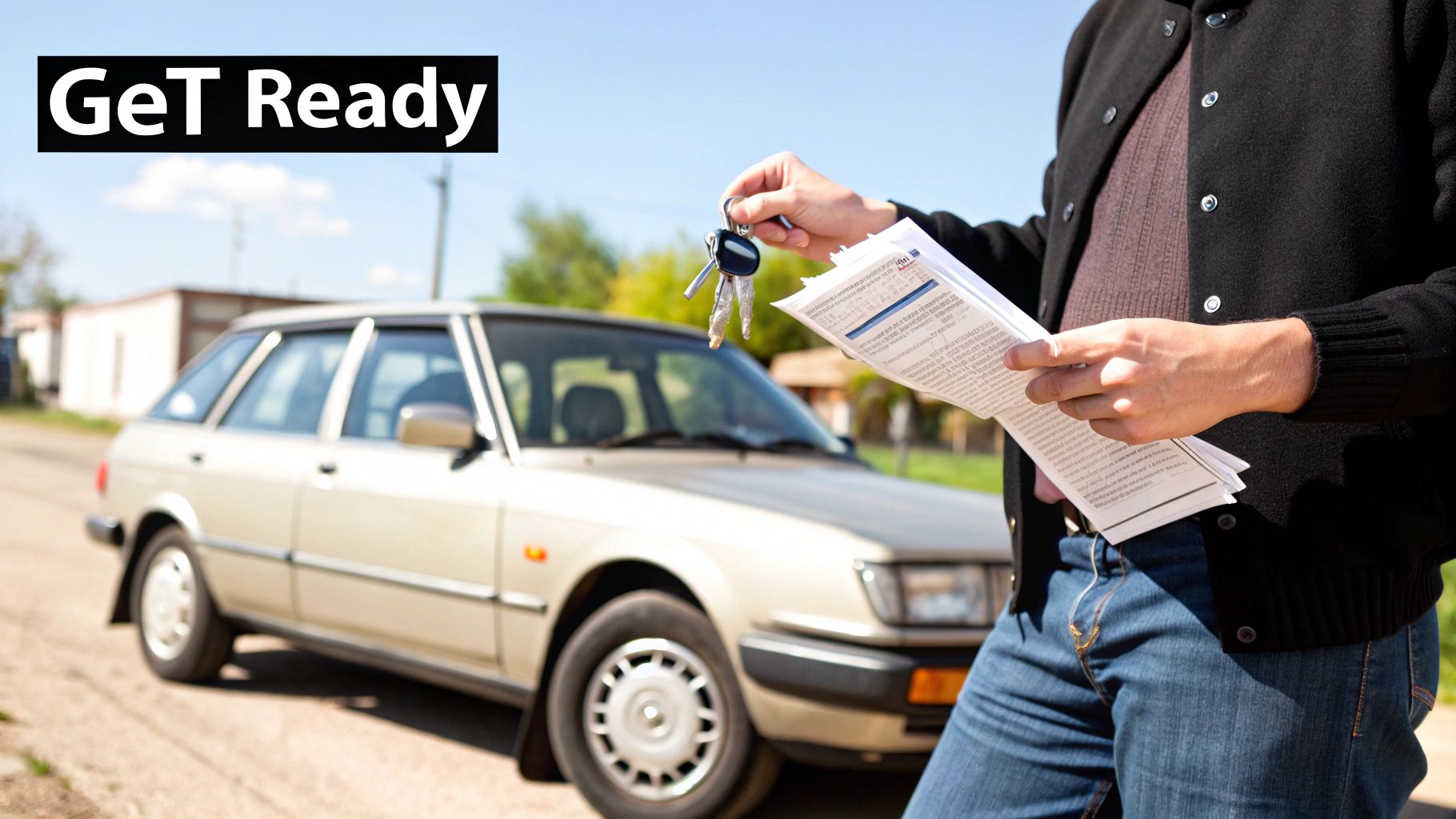
Before a wrecker even glances at your engine or checks the condition of your seats, they see your car for what it is at its most basic level: a big, heavy collection of metal. This is the absolute starting point for any cash offer they’ll make. Even a car with zero working parts and a body that’s seen far better days has a fundamental worth based purely on its weight.
Think of it this way. A baker pays a premium for a fancy, decorated cake. But even if the cake is a mess, the raw ingredients—the flour, sugar, and butter—still have a base market price. For your old car, scrap metal is the raw ingredient. It’s the guaranteed value that every single quote is built upon.
This is why you can still get paid for a car that’s essentially just a shell. The primary metals driving this price are steel, which makes up most of the frame and body, along with smaller amounts of aluminium and copper.
Why Scrap Prices Change
Here’s something many people don’t realise: the price for these metals isn't set in stone. It fluctuates on a global commodities market, just like oil or gold. If there's a construction boom overseas, the demand for steel might surge, pushing prices up right here in Adelaide. On the flip side, a global economic slowdown can cause those same prices to dip.
This means the answer to "how much will a wrecker pay?" can literally change from one month to the next. The offer you get today might be different from the one you would have received six months ago for the exact same car. It's a dynamic market, and the price is influenced by forces well beyond our local economy.
At its core, every car has a guaranteed minimum value determined by its weight in recyclable metals. This scrap value is the starting point from which wreckers add or subtract value based on salvageable parts and operational costs.
Understanding this helps you set realistic expectations from the get-go. While you might be hoping for a figure based on the car's model, knowing about the scrap value gives you a solid floor for any negotiation. It’s the absolute lowest amount your vehicle should be worth to any reputable wrecker. You can get a better sense of this by learning more about how to calculate your car's scrap value.
Key Metals and Their Contribution
Not all metal in your car is created equal, and wreckers are experts at assessing this. They can look at a vehicle and estimate the final scrap payout with surprising accuracy.
- Steel: This is the heavyweight champion. It makes up the bulk of your car's weight in the chassis and body panels, forming the largest chunk of its scrap value.
- Aluminium: Lighter but more valuable per kilo than steel, you’ll find aluminium in parts like the engine block, wheels, and some modern body panels.
- Copper: The most valuable of the common metals, copper is hiding in your car's wiring and radiator. There isn't a lot of it, but its high price definitely adds to the final total.
A professional wrecker knows exactly how to separate and process these materials to get the most out of them. That expertise is why they can offer competitive cash prices—they see a bundle of valuable commodities where others just see a junk car.
How Salvageable Parts Drive Up Your Payout
While the sheer weight of scrap metal gives your car a baseline price, the real cash is often hidden in its reusable parts. This is where your old vehicle stops being a lump of metal and becomes a goldmine of individual components. If you've ever wondered why two seemingly identical junk cars can get wildly different offers, it all comes down to what's still working under the bonnet.
Think of it this way: a pile of bricks has a certain value. But those same bricks, arranged into a sturdy, well-built wall, are worth a whole lot more. Your car's engine, transmission, and other key parts are the "well-built wall" that adds significant value beyond the raw materials. Car wreckers are experts at spotting these high-demand items they can pull and sell to mechanics or weekend warriors fixing up their own rides.
What Wreckers Are Really Looking For
In a wrecker's yard, not all parts are created equal. Some components are always in demand, either because they fail often or because buying them new from the manufacturer costs an arm and a leg. A running engine from a popular Holden ute, for instance, is worth a lot more than just its weight in metal simply because there's a constant stream of people needing one.
These are the parts that really get a wrecker's attention and boost your final offer:
- Engine and Transmission: The absolute heart and soul of the car. A healthy, running engine or a gearbox that still shifts smoothly can add hundreds—sometimes even thousands—to your payout.
- Catalytic Converter: This is a big one. It's packed with precious metals like platinum and rhodium, making it one of the most valuable single components based on its material content alone.
- Alloy Wheels and Tyres: A good-looking set of alloy wheels without major damage, especially with decent rubber still on them, are an easy flip for wreckers and add instant value.
- Clean Interior Parts: You'd be surprised! An uncracked dashboard, seats without major rips, and intact door panels from common models are highly sought after for restorations and repairs.
This image shows a clear link between a car's overall condition—a great indicator of part quality—and the cash you can expect.
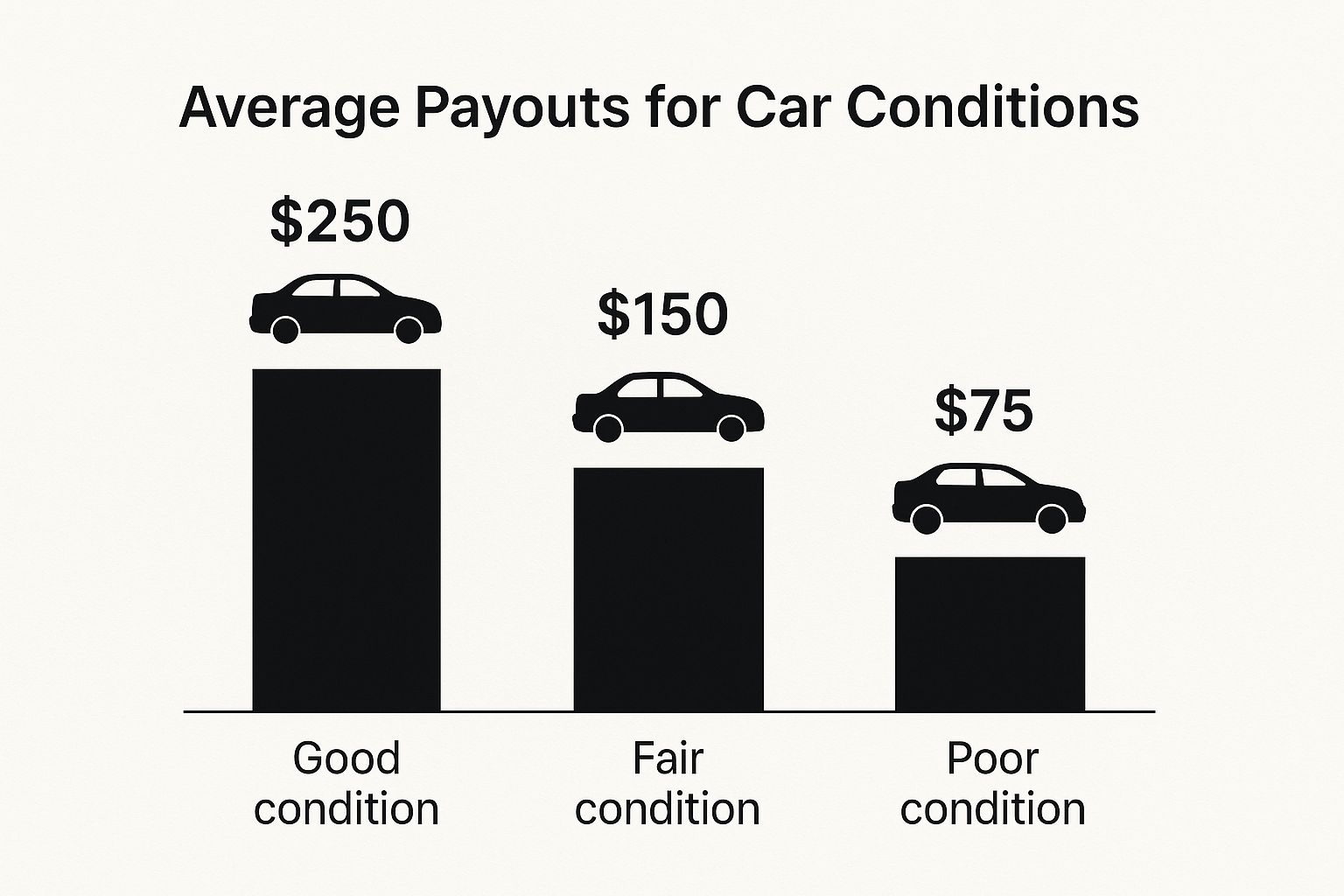
As you can see, the better the car's condition, the higher the average payout. This directly reflects the increased value and number of good, salvageable parts inside.
To give you a clearer picture, it's helpful to see which parts make a big difference versus those that are just along for the ride.
High-Demand Parts vs. Low-Value Components
| High-Value Salvageable Part | Why It's Valuable | Low-Value Component | Why It Has Less Impact |
|---|---|---|---|
| Engine Assembly | High replacement cost; essential for vehicle function. | Standard Steel Rims | Abundant and have very little resale value beyond their scrap weight. |
| Transmission | A complex and expensive component to repair or replace. | Worn-Out Tyres | Costly to dispose of and have no resale value. |
| Catalytic Converter | Contains precious metals (platinum, rhodium) with high intrinsic value. | Cracked Glass | Difficult and costly to remove and recycle; no resale potential. |
| ECU & Electronics | Specific to make/model and can be very pricey to buy new. | Damaged Body Panels | Usually only valuable as scrap metal unless from a rare or classic vehicle. |
| Alloy Wheels | High aesthetic and functional resale value if in good condition. | Ripped Upholstery | Has no resale value and can detract from the perceived quality of the interior. |
Understanding this difference is key. A car with a solid engine and good alloys will always fetch a better price than one with a seized motor and rusty steel rims, even if they are the same make and model.
Why Selling Your Car Whole Is The Smarter Move
Looking at the value of individual parts might make you think about stripping the car yourself. It seems like a good idea on the surface, but it's almost always a path to less money and a lot more work. Wreckers have the specialised tools, the space, and the industry connections to dismantle, test, and sell parts far more efficiently than the average person.
A complete vehicle, even one that's a non-runner, is a full catalogue of potential profit for a wrecker. The moment you start pulling parts off, you shrink that potential and make their job harder, which naturally leads to a lower offer for what’s left.
Wreckers are in the business of buying entire cars. They want the whole package—the good, the bad, and the scrap. For a simple process that gets you the most cash, your best bet is selling a car for scrap as one complete unit. It means you get paid for every last valuable bit without ever having to pick up a spanner. Just give an honest, detailed description of your car, and you’ll help the wrecker see its true value, resulting in the best possible cash offer for you.
What's Really Going on Behind the Wrecker's Quote
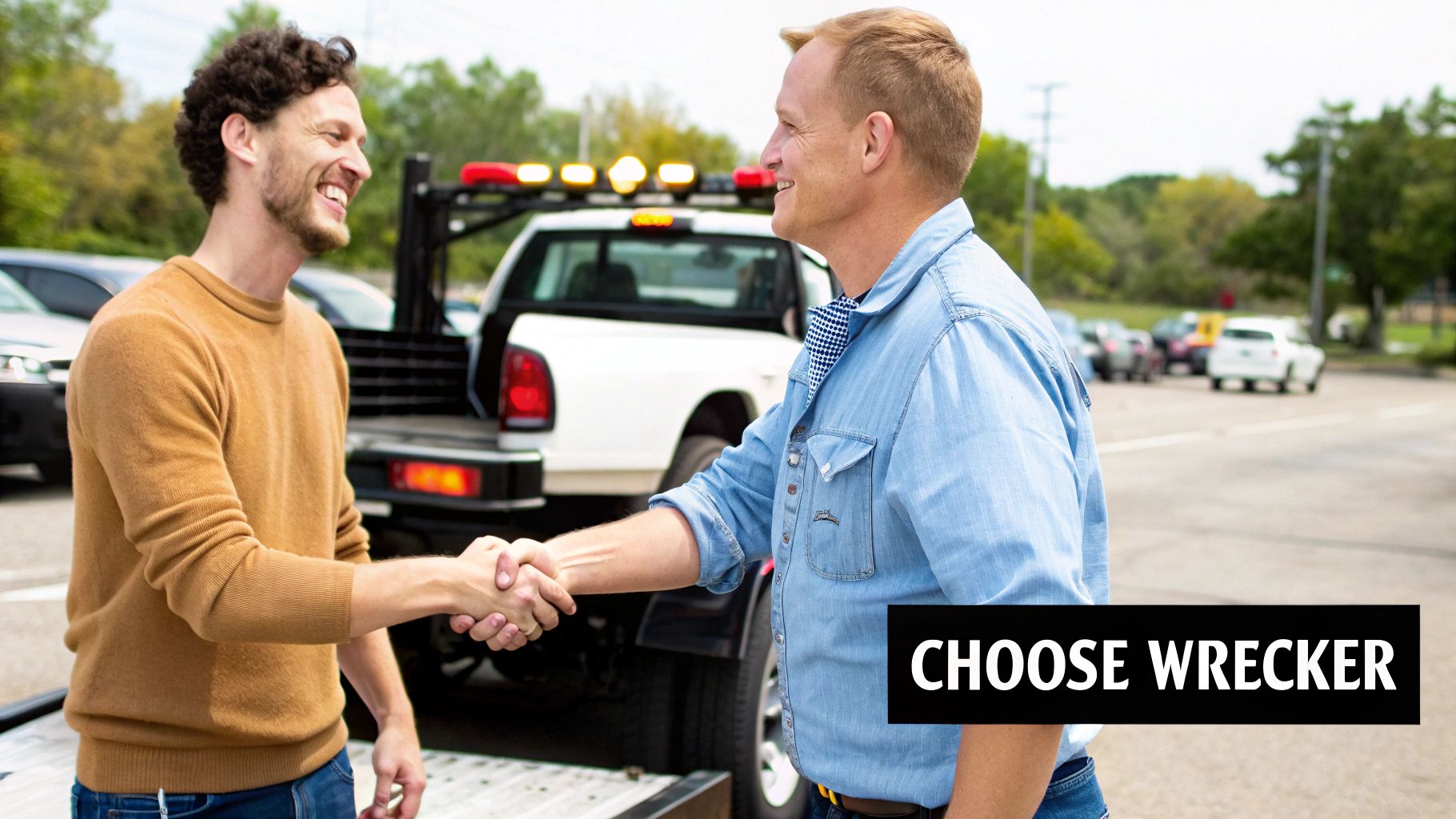
When a car wrecker gives you an offer, that number isn't just a guess. It’s a calculated figure that has to balance the value they see in your car against the very real costs of their business. The offer you get isn't pure profit for them; it's what’s left over after they subtract all their operational expenses.
It’s a bit like selling a house. The final sale price looks great on paper, but the seller doesn’t walk away with the whole amount. They first have to pay the agent’s commission, closing costs, and other administrative fees. A wrecker's cash offer is built on the same principle, factoring in several essential "hidden costs" that are just part of the job.
Getting your head around these overheads helps set realistic expectations for what you can get for your old car. It also explains why quotes can vary so much between different companies and shows that a fair price is about more than just the weight of scrap metal.
The Overheads: Logistics and Legal Stuff
The biggest expenses for any wrecker are tied to the physical effort of moving your car and the legal requirements for processing it. These aren't optional add-ons; they're core parts of the service that have a direct impact on the cash you’re offered.
-
Towing and Transport: Even when a wrecker advertises "free towing," that cost is still baked into the numbers. They have to account for fuel, truck maintenance, insurance, and the driver's wages. Naturally, the further they have to travel to get to you, the more it cuts into their margin.
-
Yard Space and Labour: Once your car is picked up, it takes up valuable real estate in their wrecking yard. Running a yard that can hold hundreds of vehicles costs a lot, and that’s before you even consider paying the skilled team needed to safely move, dismantle, and process everything.
-
Environmental Compliance: Cars are full of nasty stuff—battery acid, engine oil, coolant, and air-conditioning refrigerants. Wreckers are legally bound to dispose of these hazardous materials safely and responsibly. This involves specialised equipment and processes, not to mention compliance fees.
-
The Paperwork Trail: Properly deregistering a vehicle and lodging the Notice of Disposal takes time and administrative effort. It's a crucial step to ensure the car is legally off the road and no longer your responsibility.
How Government Rules Influence the Final Price
A lot of these costs are heavily influenced by government regulations, and these can change quite a bit from state to state. For instance, the rules dictating accident towing fees and vehicle storage charges have a direct say in a wrecker's bottom line.
A wrecker's final offer is a delicate balancing act. It has to reflect the real-world value of your car's salvageable parts and scrap metal, while also covering all the non-negotiable costs of towing, storage, environmental safety, and administration.
In Victoria, for example, the fees that tow operators and wreckers can charge are tightly controlled. A recent government review shows that daily storage fees can be anywhere from AU$20.90 to AU$30.90, depending on whether the car is stored outside or under cover. This kind of regulated pricing, which you'll find in other states like Western Australia too, sets a clear baseline expense that has to be factored into every single car they acquire.
You can read the full review on accident towing fees to get a deeper insight into how these rules work. At the end of the day, accounting for these logistical and regulatory costs is the only way a wrecker can make you a fair, sustainable offer.
Your Questions Answered
If you’re thinking about selling your old car to a wrecker, you probably have a few questions. That's completely normal. Getting clear answers is the best way to feel confident about the process and know what kind of cash you can realistically get.
We hear a lot of the same questions from car owners around Adelaide, so let's run through them.
Do I Get More Money If My Car Is Still Running?
Short answer: yes, almost always. A car that still runs is a much more valuable proposition for a wrecker, and that will be reflected in your offer.
The reason is simple. The engine and transmission are the two most valuable parts in most vehicles. If we can see and hear them working, we know they can be salvaged and resold for a good price. A running car also tells us that other bits and pieces—like the alternator or starter motor—are probably in decent shape too.
Plus, there's a practical side to it. A car we can drive onto the tow truck or around our yard saves us a lot of hassle. We don't have to push it or get the forklift out, which saves time and money. We're happy to pass a bit of that saving back to you.
What Paperwork Do I Need To Sell My Car In Adelaide?
The paperwork side of things in South Australia is pretty straightforward. You'll mainly need two things: proof that you own the car (your vehicle's registration certificate is perfect for this) and a valid photo ID, like your driver's licence, so we can confirm who you are.
A professional wrecker will take care of the official disposal paperwork for you. This includes lodging a Notice of Disposal, which is crucial because it officially takes the car out of your name. That's your protection against any future fines or tolls. Just remember to grab your personal belongings and the number plates before we pick it up.
Will I Get Paid More If I Deliver The Car Myself?
It's definitely worth asking about. Most wreckers, us included, roll the cost of free towing into the final cash offer. It's a convenience we provide. So, if you're in a position to safely and legally bring the car to our yard, you're saving us a trip.
That saving can often mean a slightly better payout for you. The key is to check with the wrecker first. Give them a call and ask if they offer a bonus for self-delivery. Then you can weigh up if the extra cash is worth the effort of getting the car there yourself.
How Do I Get The Best Possible Price From A Car Wrecker?
Getting the best price really boils down to making the wrecker's job easier and showing them what your car is truly worth. A few simple steps can make a real difference to the offer you receive.
Here’s what you can do to put yourself in the best position:
- Be Honest and Detailed: When you ask for a quote, give us the full picture. The make, model, year, and its general condition are essential. Telling us if it runs, what's broken, or what's still in great shape helps us build an accurate, fair price right from the get-go.
- Don't Strip Parts: It can be tempting to pull off a few valuable parts to sell separately, but resist. A complete vehicle is far more valuable to us because we get a full inventory of components to assess and salvage.
- Have Your Docs Ready: Having your proof of ownership and ID handy makes the whole process smooth and professional. It shows you're organised and ready to do business, which we always appreciate.
- Choose a Reputable Wrecker: This is a big one. Always go with a licensed and insured business that has a solid history of good customer reviews. A transparent company won't play games with their quotes and will offer you a genuinely fair price.
Ready to turn that old car into cash? At Auto Removal Adelaide, we offer top-dollar prices up to $8,999 and provide free, same-day removal across the city. Get a quick, no-obligation quote today by visiting our website at https://autoremovaladelaide.com.au and see what your car is really worth.

